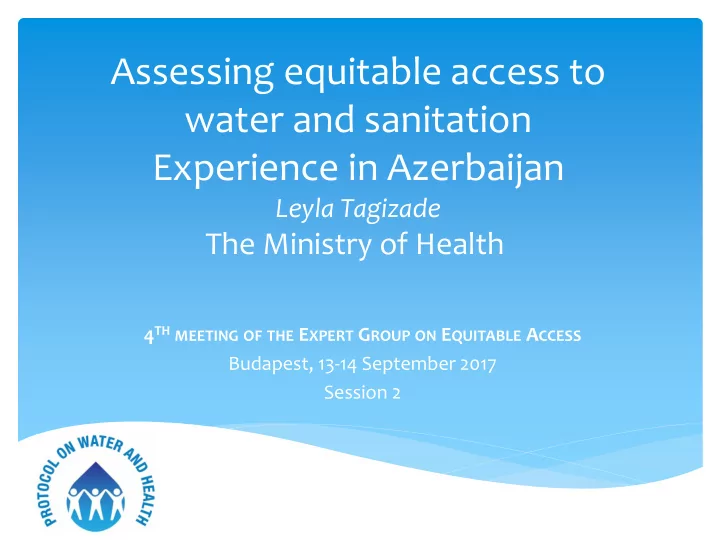

Assessing equitable access to water and sanitation Experience in Azerbaijan Leyla Tagizade The Ministry of Health 4 TH MEETING OF THE E XPERT G ROUP ON E QUITABLE A CCESS Budapest, 13-14 September 2017 Session 2
Background and objectives of the equitable access assessment The Protocol on Water and Health was ratified by the Republic of Azerbaijan in 2002 (three series of reports) In 2015, the United Nations Economic Commission for Europe and the World Health Organization initiated the process of filling out the Score Card (Score Card) to support political processes to achieve human rights access to water and sanitation services in AR. In 2016, along with the completion of the Documentation of Targeted Indicators in the Republic of Azerbaijan, the Score Card has been completed. The gaps found in the completion of the valuation sheet (the lack of water and sanitation at schools, the geographical inequalities in supplying the population, and the definition of vulnerable groups of populations) coincide with the commitments we have undertaken with the Sustainable Development Program. These issues are reflected in the 4th section of the MDG Targets of AR. Thanks to The Score Card, we have made a step closer to the Sustainable Development Goals.
Process: Applying the Equitable Access Score-card Lead organization(s): Ministry of Health and Ministry of Ecology and Natural Resources Support by: The European Regional Office, The European Union Water Initiative and Development Account to the UN international commitment Partners: State Water Resources Agency of the Ministry of Emergency Situations of the Azerbaijan Republic, Azersu OJSC, Baku State University, State Statistical Committee of the Azerbaijan Republic, Ministry of Labor and Social Protection, The Commissioner for Human Rights of The Republic of Azerbaijan, Ministry of Education, State Committee for Affairs of Refugees and Internally Displaced Persons of The Republic of Azerbaijan, Ruzigar non-governmental organization Scale of the project: national Timeline: 2016 Activity Date 1. Technical Task Draft October 2015 2. Support for political processes to achieve human rights access to water and sanitation services (Water and Health Protocol to the Convention on the Use of Transboundary Watercourses (Teams) and International Lakes)
Outcomes of the assessment: main findings Situation of equitable access to water and sanitation Schoolchildren and vulnerable people (children's institutions, children's homes, nursing homes) provide equal access to water and sanitation services Taking appropriate steps to achieve Sustainable Development Goals, introducing state programs (eliminating geographical separation), ensuring continuity of sanitation awareness campaigns, ensuring the continuity of sanitation awareness campaigns, access to drinking water and sanitation services provided by the Constitution of the Republic of Azerbaijan (live in a healthy environment, and so on), access to potable water and sanitation services ensuring that the requirements of Article 11 of the International Covenant on Economic, Social and Cultural Rights are met. Poor regulatory framework for water resources management when emergencies occur The resuscitation of wastewater is at the initial level Public Toilets will be charged (except for the mall shopping centers) Arrangement of transboundary rivers for drinking water in the Republic of Azerbaijan
Outcomes of the assessment: lessons learnt from the process Process Inter-agency approach - inter-ministerial cooperation, exchange of views; Score Card has enabled the systematization of the social life level in the AR, operational detection of gaps; The Workgroup Group's experts, who are involved in compiling the Score Card, are prepared for the next steps, i.e. Strategic Analysis and Action Plan, as they have a well-balanced and relevant experience base. The process has not been completed because the results of the Score Card has not been discussed with the institutions (organizations that have been in the process); The support of the organizations we have mentioned above is important for the process to be completed.(, the United Nations Economic Commission for Europe and the World Health Organization)
Communication of the findings The process of evaluation of a work sheet( Score Card) in the position of waiting for the inter-relationship
Planned next steps Strategic analysis Action Planned
Assessing equitable access to water and sanitation Experience in Azerbaijan Thanks for your attentions
Recommend
More recommend